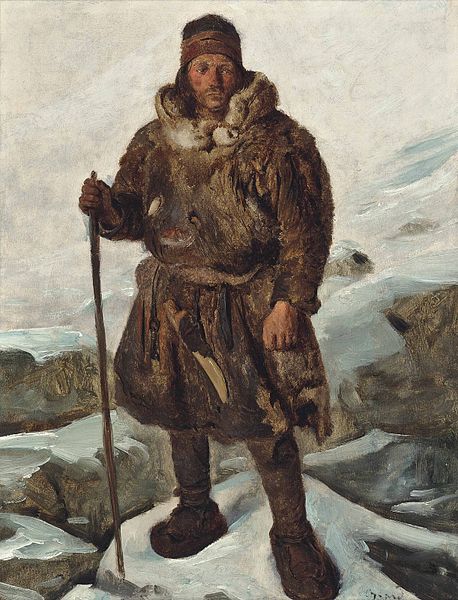Vaeltajat
Some question why we try to live in the uninhabitable wastes. I ask them, where are we to go? This is our home, and has always been so. They never seem to know how to reply.The Vaeltajat are a group of human people indigenous to the northern reaches of Iskaldhal. They settled in the northern lands as part of the greater human migration to the north, and are closely related to the Rejsende and the Eksleja, among other human peoples. Throughout history, other close relatives of the Vaeltajat have settled in the Medimian Empire, Terenholt, and Vuorenmaa - this close-knit ethnic group of humanity is often referred to as the People of the North due to their proclivity for settling in the bitter cold where little else survives. In the modern day, the Vaeltajat can largely be found in the areas of the great lakes of Siellumearra, in Naarim and Myrkalla, and around the Kylmävikk Desert. As a whole, they are largely peoples of the wilderness, preferring to roam the open snowfields rather than be penned into city walls, and as such rarely settle down for too long. Many of the wandering tribes of the north are comprised of the Vaeltajat - including the Witch-Tribes, largely located around Siellumearra. Whilst a number of witches are not Vaeltajat, they largely remain on good relations with members of Vaeltajat tribes, treating them better than they might a band of adventurers from Naarim.
Naming Traditions
The Vaeltajat do not often use family names in the traditional sense, and instead use tribal identifiers. To honour one's parents, the parent's first name is instead given to their child as a middle name -- this usually corresponds with gender, but is the joint decision of both parents and the tribal elders. A child may choose to change their name upon completing their walk of the Unguided Path, and again upon marrying. Marriage is seen as a sacred bond above all, and if a marriage occurs between two groups, a discussion takes place to determine if any will take the name of their new tribe's name. Regardless of what married partners choose to do, their children are always given the name of the tribe in which they grew up.Tribal Names
Feminine Names
Masculine Names
Culture
Coming of Age Rites
See To Walk the Unguided Path for more details on the Vaeltajat's coming of age rites.
Funerary and Memorial customs
Walk well in the long night, friend.Death is a common friend of the Vaeltajat. Due to the freezing temperatures in northern Iskaldhal for most of the year, decomposition slows to a crawl; it was therefore necessary for the Vaeltajat to develop funerary customs that prevented animals from ravaging the corpses of their fallen friends. Most commonly, this takes the form of a funeral pyre. The entire tribe gathers for these where possible, and encircles the pyre to sing a song of farewell - this is said to guide the departed soul up the highest mountain, past the peak of even Kyöpelinvuori, so that they may walk the stars and find their rest. The names of the dead are recorded in oral tradition and passed down through generations; in particular, the names of lost children and those who pass on the Unguided Path are re-used first. This is seen as the young soul returning for a second attempt at life, or as a new soul - a soul-sibling of the lost, rarely actually blood-related - arriving to carry their sibling's torch.
Ideals
Relationship Ideals
Ah, my son's husband is so kind! He helps his dear new mother more than my son has! He married very well!Relationships are done a little differently in Vaeltajat tribes - in a manner often confusing to outsiders. The concept of formally dating does not exist, and partnerships are by no means limited to two. Similarly, marriages can be performed with any number of groups and in any permutation, though usually still represent a deep romantic bond. Partnerships begin with a confession of attraction, and proceed with gestures of affection, gifts, and spending time around one another. Marriage usually occurs after at least one year, and require the blessing of the tribal elders. If parents of any member of the marrying group have concerns, they may address these with the elders and the group themselves. Children are the highest priority of any tribe, and relationships that do not produce children are expected to either adopt or lend assistance in other ways - for instance, taking care of the children when their parents are busy or unwell. This is not forced -- it is merely social pressure. Infertility and relationships where reproduction is both unviable and unwanted are known, understood, and usually respected.
Related Locations
Many references exist in this ethnicity to the languages of the real-world Sámi people, and to Finnish. Whilst the names and language may be the same, the details are not.





I like that there is an acceptance of the inability to have children even in a society that values them. It's a nice, heartwarming addition, and solving it by have social pressure to help where is needed instead is a great idea. Wonderful article :)
It's something I'd very much like to see more of in real life. Straight and fertile relationships where both have the desire for children aren't 100% of any community.
welcome to my signature! check out istralar!